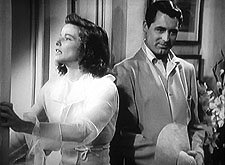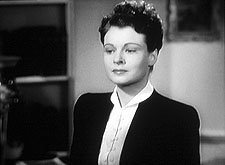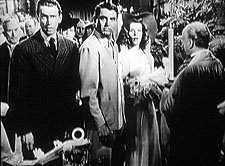 I've been doing a bit of "re-watching" of some all-time favourites, such as The Philadelphia Story, which I ran in the DVD player last night. I've lost track of how many times I've seen this movie.
I've been doing a bit of "re-watching" of some all-time favourites, such as The Philadelphia Story, which I ran in the DVD player last night. I've lost track of how many times I've seen this movie. In re-watching films like this I usually find, as with The Philadelphia Story, that during the first few minutes, as great as they are, I have a sense of, "Gee, I've seen this so many times; do I really want to see it again?" Yet in a very short time I'm into the film's stream and fully engaged as if I'm seeing it for the first time.
Actually, this is something of a problem. Studying, reviewing, critiquing bad movies is relatively easy because you aren't very involved with the film. You can step back and see it objectively - or hopefully you can.
But with a really good film, it's sometimes difficult to identify why it is so good because, at least in part, it engages you so fully you forget you are watching a movie and, being caught up in the film's story, you neglect to note some of the technical aspects of the story-telling, such as structure.
For me, this is certainly the case with The Philadelphia Story. Moments after it starts I'm into the film and, no matter how strong my intent was to view it from a technical perspective, I can't. I'm too busy enjoying it.
 I can, however, make a few guesses as to why this movie works so well. There are, of course, the performances. While we all note how good Cary Grant, Katherine Hepburn and Jimmy Stewart are, and how well they work as an ensemble, it goes well beyond that to the greater ensemble. By this I mean the many wonderful supporting performances - one of the keys to many of the great old Hollywood films and a definite key here.
I can, however, make a few guesses as to why this movie works so well. There are, of course, the performances. While we all note how good Cary Grant, Katherine Hepburn and Jimmy Stewart are, and how well they work as an ensemble, it goes well beyond that to the greater ensemble. By this I mean the many wonderful supporting performances - one of the keys to many of the great old Hollywood films and a definite key here.Another reason it works so well is because the various "acts" of the film fit so well together. You often hear of some films, "It was great till the third act, then it just turned into a car chase," or "It was okay but the second act dragged." In the case of The Philadelphia Story, there is a wonderful balance between the acts (perhaps because it began as a play). In fact, it's difficult to say where the transitions are because everything seems to unfold so naturally. The movie feels seamless.
It also seems to me that another reason the film works brilliantly is because it is so well focused on its essential theme which, I think, is articulated first by Cary Grant as C. K. Dexter Haven (and later repeated by Hepburn's Tracy Lord):
"... You'll never be a first-class human being or a first-class woman until you've learned to have regard for human frailty."
This is focused in Tracy, who is contemptuous of her ex-husband (Grant) and her father (John Halliday as Seth Lord).
The film is all about "human frailty" ... it's a kind of celebration of it, and it's reflected everywhere in the movie. (Such as Ruth Hussey as Liz when, questioned by Grant, she refers to Jimmy Stewart's character Macaulay Connor and suggests that, yes, she's in love with him but is willing to wait for him to ... well, grow up is essentially what she means.)
It all reminds me of a line at the end of Mark Helprin's novel Memoir from Antproof Case, which goes:
"Though the world is constructed to serve glory, success, and strength, one love's ones parents and one's children despite their failings and weaknesses - sometimes even more on account of them."
 I'm surprised I've managed to write as much as I have about the movie. I had been scratching my noggin to think of what to say other than, "I really, really like it!" But I suppose I've discovered at least three of the reasons why it works so well for me: focus, balance and performance. And of course, it's theme of human failings goes over big with me.
I'm surprised I've managed to write as much as I have about the movie. I had been scratching my noggin to think of what to say other than, "I really, really like it!" But I suppose I've discovered at least three of the reasons why it works so well for me: focus, balance and performance. And of course, it's theme of human failings goes over big with me.To me, this is a perfect diamond of a film. It's easily one of the best romantic comedies ever made.
(On another note, for what it's worth ... I finally received the e-mail saying my Amazon order has shipped. That means my John Wayne-John Ford Film Collection is finally on the way. It should arrive Tuesday - at least, I hope it does.)
Tags: Movies, DVD, The Philadelphia Story, Cary Grant, Katherine Hepburn, Jimmy Stewart
No comments:
Post a Comment